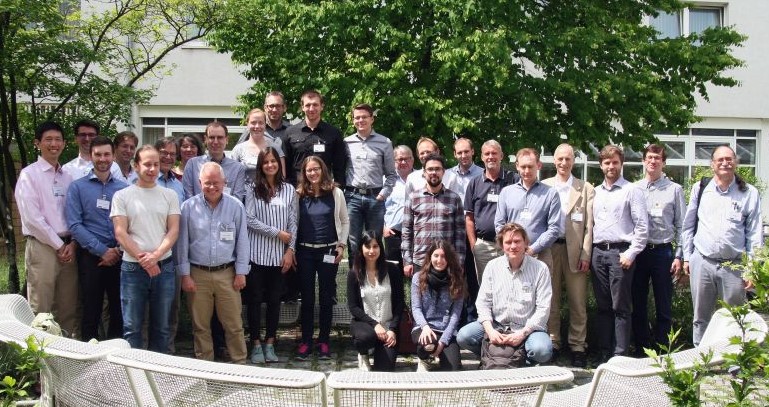Veranstaltungen
|
Proteins in realistic environments: simulation meets experiment |
|
| Event date: | May 23, 2018 9:00 AM to May 25, 2018 4:00 PM |
|---|---|
|
The thorough understanding of the multi-faceted properties of proteins in realistic environments is considered to be a major challenge to both modelers and experimentalists, due to the complexity of the systems. Enzyme-catalyzed reactions or functional biomaterials are described by different interacting structures and coupled processes on a broad range of length and time scales. Systematic reporting and analyzing of available high-throughput experimental data is still hampered by the lack of standards and of platforms which integrate data with models. In the CECAM Workshop on „Proteins in realistic environments: simulation meets experiment” (Stuttgart, 23th to 25th May 2018) experts from complementary research fields in modelling and experimentation met to exchange their view on the current challenges and to discuss how to overcome limitations. There was a general agreement that integration on different levels is crucial: of experimental data from different types of experiments to link those to simulation results and of simulations on different scales to obtain a holistic view of the investigated complex biomolecular systems. Data integration, scale bridging, and multiphysics approaches are promising strategies to establish holistic models from first principles descriptions which can be applied for the rational engineering of bioprocesses. The workshop was organized by Niels Hansen (Stuttgart), Antje Spieß (Braunschweig), and Jürgen Pleiss (Stuttgart) and funded by the Collaborative Research Center 716 and the Cluster of Excellence SimTech.
Invited speakers: Johan Åqvist (Uppsala University): Computation of enzyme cold adaptation Jörg Behler (University of Göttingen): High-dimensional neural network potentials for complex systems Benoit David (INSA Toulouse): Bridging simulation and experiment: A rational approach aiming to convert b-glycosidases into transglycosidases by engineering the protein internal water dynamics Ron Elber (University of Texas at Austin): The function of HIV reverse transcriptase Peter Halling (University of Strathclyde): Informatic tools to prevent omissions in biocatalytic data recording: STRENDA DB and future hopes Florian Hollfelder (University of Cambridge): Tracking catalytic promiscuity in sequence space Chris Oostenbrink (University of Natural Resources and Life Science, Vienna): Influence of force field, environmental changes and post-translational modifications on protein structure and stability Silvia Osuna (University of Girona): The role of conformational dynamics for novel enzyme function Albert C. Pan (D.E. Shaw Research): Atomic level characterization of protein-protein association Nicole Radde (University of Stuttgart): Uncertainty quantification for model predictions from variable measurements Santiago Schnell (University of Michigan): Exploring standardized protocols to measure and estimate enzyme kinetic parameters Walter Thiel (MPI Mülheim): QM/MM studies of enzymatic reactions Roland Winter (TU Dortmund University): Combined effects of crowding, osmolytes, temperature and pressure on the conformational dynamics and reactivity of proteins John Woodley (Technical University of Denmark): The importance of K M: From measurement to model and process For further information please visit the CECAM workshop's website. |
|
| Event location: |
Universität Stuttgart, Campus.Guest Campus Vaihingen Universitätsstraße 34 70569 Stuttgart Link: Campus.Guest |


